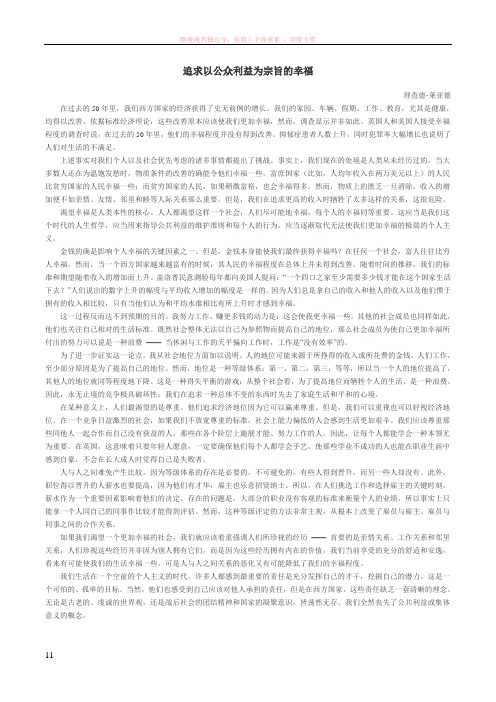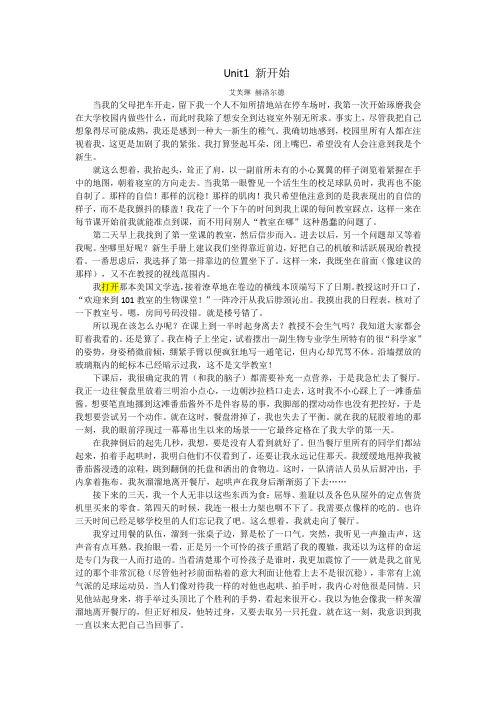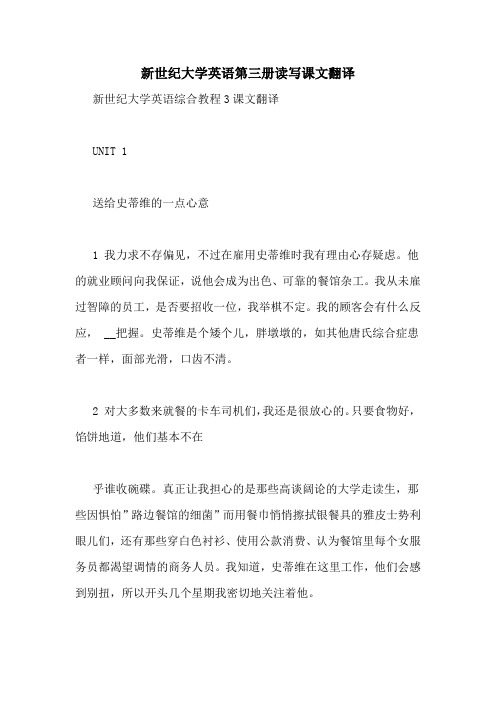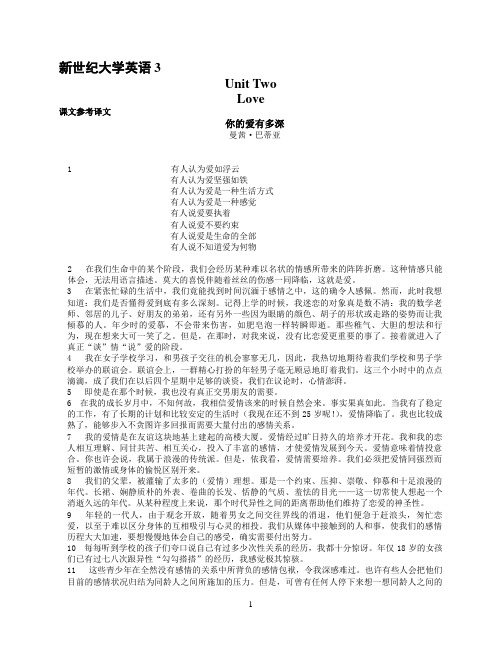新世纪大学英语第三册原文每段翻译U
新世纪大学英语3-unit3课文翻译及单词解析

追求以公众利益为宗旨的幸福理查德·莱亚德在过去的50年里,我们西方国家的经济获得了史无前例的增长。
我们的家园、车辆、假期、工作、教育,尤其是健康,均得以改善。
依据标准经济理论,这些改善原本应该使我们更加幸福,然而,调查显示并非如此。
英国人和美国人接受幸福程度的调查时说,在过去的50年里,他们的幸福程度并没有得到改善。
抑郁症患者人数上升,同时犯罪率大幅增长也说明了人们对生活的不满足。
上述事实对我们个人以及社会优先考虑的诸多事情都提出了挑战。
事实上,我们现在的处境是人类从未经历过的。
当大多数人还在为温饱发愁时,物质条件的改善的确能令他们幸福一些。
富庶国家(比如,人均年收入在两万美元以上)的人民比贫穷国家的人民幸福一些;而贫穷国家的人民,如果稍微富裕,也会幸福得多。
然而,物质上的匮乏一旦消除,收入的增加便不如亲情、友情、邻里和睦等人际关系那么重要。
但是,我们在追求更高的收入时牺牲了太多这样的关系,这很危险。
渴望幸福是人类本性的核心。
人人都渴望这样一个社会:人们尽可能地幸福,每个人的幸福同等重要。
这应当是我们这个时代的人生哲学,应当用来指导公共利益的维护准则和每个人的行为,应当逐渐取代无法使我们更加幸福的极端的个人主义。
金钱的确是影响个人幸福的关键因素之一。
但是,金钱本身能使我们最终获得幸福吗?在任何一个社会,富人往往比穷人幸福。
然而,当一个西方国家越来越富有的时候,其人民的幸福程度在总体上并未得到改善。
随着时间的推移,我们的标准和期望随着收入的增加而上升。
盖洛普民意测验每年都向美国人提问:“一个四口之家至少需要多少钱才能在这个国家生活下去?”人们说出的数字上升的幅度与平均收入增加的幅度是一样的。
因为人们总是拿自己的收入和他人的收入以及他们惯于拥有的收入相比较,只有当他们认为和平均水准相比有所上升时才感到幸福。
这一过程反而达不到预期的目的。
我努力工作、赚更多钱的动力是:这会使我更幸福一些。
其他的社会成员也同样如此,他们也关注自己相对的生活标准。
新世纪大学英语第三册读写课文翻译

新世纪大学英语第三册读写课文翻译篇一:新世纪大学英语第三册读写课文翻译新视野大学英语3课文翻译unit 1A我哥哥吉米出生时遇上难产,因为缺氧导致大脑受损。
两年后,我出生了。
从此以后,我的生活便围绕我哥哥转。
伴随我成长的,是“到外面去玩,把你哥哥也带上。
”不带上他,我是哪里也去不了的。
因此,我怂恿邻居的孩子到我家来,尽情地玩孩子们玩的游戏。
我母亲教吉米学习日常自理,比如刷牙或系皮带什么的。
我父亲宅心仁厚,他的耐心和理解使一家人心贴着心。
我则负责外面的事,找到那些欺负我哥哥的孩子们的父母,告他们的状,为我哥哥讨回公道。
父亲和吉米形影不离。
他们一道吃早饭,平时每天早上一道开车去海军航运中心,他们都在那里工作,吉米在那搬卸标有彩色代号的箱子。
晚饭后,他们一道交谈,玩游戏,直到深夜。
他们甚至用口哨吹相同的曲调。
所以,父亲1991年因心脏病去世时,吉米几乎崩溃了,尽管他尽量不表现出来。
他就是不能相信父亲去世这一事实。
通常,他是一个令人愉快的人,现在却一言不发,无论说多少话都不能透过他木然的脸部表情了解他的心事。
我雇了一个人和他住在一起,开车送他去上班。
然而,不管我怎么努力地维持原状,吉米还是认为他熟悉的世界已经消失了。
有一天,我问他:“你是不是想念爸爸?”他的嘴唇颤抖了几下,然后问我:“你怎么看,玛格丽特?他是我最好的朋友。
” 接着,我俩都流下了眼泪。
六个月后,母亲因肺癌去世,剩下我一人来照顾吉米。
吉米不能马上适应去上班时没有父亲陪着,因此搬来纽约和我一起住了一段时间。
我走到哪里他就跟到哪里,他好像适应得很好。
但吉米依然想住在我父母的房子里,继续干他原来的工作。
我答应把他送回去。
此事最后做成了。
如今,他在那里生活了11年,在许多人的照料下,同时依靠自己生活得有声有色。
他已成了邻里间不可或缺的人物。
如果你有邮件要收,或有狗要遛,他就是你所要的人。
当然,母亲的话没错:可以有一个家,既能容纳他的缺陷又能装下我的雄心。
【精品】新世纪大学英语阅读教程3阅读翻译U1-U4

Unit1Part1 The graduation advice I never got but wish I had 全国的大学毕业生们都为春天令人最难以忍受的仪式做好准备:毕业典礼致辞。
大家都知道这个程序,一个小有名气的人会趾高气昂地走上主席台,滔滔不绝地讲些陈词滥调:“世界正在等待着……你们是特别的一代……去拯救这个星球吧”等等等等废话。
一个好机会被白白地浪费了。
如果这些毕业典礼的演讲者能够讲一些实际有用的东西该有多好!像这样说:毕业生们,大家好,祝贺你们。
今天你们将离开培育你们的学术环境,直面真实的世界。
在未来的好几年里每个月你都会想起你的学校,比如当你接到一个又一个的来电,希望你为校友基金捐款时,甚至当你开出大额的支票去偿还助学贷款时。
但是我们来看看光明的一面。
你们即将离开学校,终于可以开始接受教育了。
为了帮助你开始毕业后生活,这里有一些建议:花时间与跟你不一样的人在一起。
从你进校的第一天起,你就听到了太多无关的人在一起于学校为创建“多样性”所付出的努力。
所以当你发现你的校园几乎是全美国最隔离的环境之一时你很能会惊讶不已。
校园里不同种族的人有不同的学习方向,参加不同的毕业典礼上,甚至在餐厅不同的区域用餐。
你有可能会被有些教授华丽的辞藻弄糊涂。
那些教授一边会说种族之间根本没有差别,同时又说,应该不惜一切保留种族之间的差别。
面对事实吧。
真正的多样性简直是无处可寻。
而且我并不只是指种族方面。
当课堂活动都是按照群体思维设计的练习时,哪里还有思维上的多样性呢?想找到一位保守的教授,那比要找到一个雪人还难。
若想挑战一些有关政治正确性的正统观点,那你将会被冠以一些难听的名号。
只有现在从大学毕业之后,你才能真正从多样性中获益。
先从了解与你肤色不同的人开始。
接触一群与你持有不同的政治立场的朋友,恭敬地听他们阐述他们的观点。
随后去认识从事其他职业的人。
往往人们在选择某一个职业之后,专业性会加强但是却不再关心其他方面的知识,因此知识面会变窄。
新世纪高等院校英专本科生系列教材《综合教程》第三册 unit1 Fresh Start课文翻译

Unit1 新开始艾芙琳赫洛尔德当我的父母把车开走,留下我一个人不知所措地站在停车场时,我第一次开始琢磨我会在大学校园内做些什么,而此时我除了想安全到达寝室外别无所求。
事实上,尽管我把自己想象得尽可能成熟,我还是感到一种大一新生的稚气。
我确切地感到,校园里所有人都在注视着我,这更是加剧了我的紧张。
我打算竖起耳朵,闭上嘴巴,希望没有人会注意到我是个新生。
就这么想着,我抬起头,耸正了肩,以一副前所未有的小心翼翼的样子浏览着紧握在手中的地图,朝着寝室的方向走去。
当我第一眼瞥见一个活生生的校足球队员时,我再也不能自制了。
那样的自信!那样的沉稳!那样的肌肉!我只希望他注意到的是我表现出的自信的样子,而不是我颤抖的膝盖!我花了一个下午的时间到我上课的每间教室踩点,这样一来在每节课开始前我就能准点到课,而不用问别人“教室在哪”这种愚蠢的问题了。
第二天早上我找到了第一堂课的教室,然后信步而入。
进去以后,另一个问题却又等着我呢。
坐哪里好呢?新生手册上建议我们坐得靠近前边,好把自己的机敏和活跃展现给教授看。
一番思虑后,我选择了第一排靠边的位置坐下了。
这样一来,我既坐在前面(像建议的那样),又不在教授的视线范围内。
我打开那本美国文学选,接着潦草地在卷边的横线本顶端写下了日期。
教授这时开口了,“欢迎来到101教室的生物课堂!”一阵冷汗从我后脖颈沁出。
我摸出我的日程表,核对了一下教室号。
嗯,房间号码没错。
就是楼号错了。
所以现在该怎么办呢?在课上到一半时起身离去?教授不会生气吗?我知道大家都会盯着我看的。
还是算了。
我在椅子上坐定,试着摆出一副生物专业学生所特有的很“科学家”的姿势,身姿稍微前倾,绷紧手臂以便疯狂地写一通笔记,但内心却咒骂不休。
沿墙摆放的玻璃瓶内的蛇标本已经暗示过我,这不是文学教室!下课后,我很确定我的胃(和我的脑子)都需要补充一点营养,于是我急忙去了餐厅。
我正一边往餐盘里放着三明治小点心,一边朝沙拉档口走去,这时我不小心踩上了一滩番茄酱。
新世纪大学英语第三册读写课文翻译

新世纪大学英语第三册读写课文翻译新世纪大学英语综合教程3课文翻译UNIT 1送给史蒂维的一点心意1 我力求不存偏见,不过在雇用史蒂维时我有理由心存疑虑。
他的就业顾问向我保证,说他会成为出色、可靠的餐馆杂工。
我从未雇过智障的员工,是否要招收一位,我举棋不定。
我的顾客会有什么反应, __把握。
史蒂维是个矮个儿,胖墩墩的,如其他唐氏综合症患者一样,面部光滑,口齿不清。
2 对大多数来就餐的卡车司机们,我还是很放心的。
只要食物好,馅饼地道,他们基本不在乎谁收碗碟。
真正让我担心的是那些高谈阔论的大学走读生,那些因惧怕”路边餐馆的细菌”而用餐巾悄悄擦拭银餐具的雅皮士势利眼儿们,还有那些穿白色衬衫、使用公款消费、认为餐馆里每个女服务员都渴望调情的商务人员。
我知道,史蒂维在这里工作,他们会感到别扭,所以开头几个星期我密切地关注着他。
3 我的担心是多余的。
第一周过后,史蒂维就抓住了我每位员工的心。
不足一个月,我的老顾客 ? 那些卡车司机们 ? 就正式认定史蒂维为卡车司机休息站的吉祥人物。
自此以后,我不再介意其他顾客的看法了。
4 史蒂维21岁,蓝色牛仔裤,耐克运动鞋,满面笑容,讨人喜爱,极端地敬业。
他收拾好一张餐桌后,盐瓶和胡椒瓶归于原位,丝毫不差,桌面不见一点面包屑、一滴咖啡液。
5 我们唯一的问题是得说服他等待客人用餐完毕再去收拾桌子。
他总是在不起眼的地方守候,左右脚替换着支撑体重,眼睛巡视整个餐厅。
一看见哪张餐桌边的客人都离去,他立即赶过去,仔细地把碗碟收拾到餐车上,拿起抹布细密地擦桌子,动作娴熟、夸张。
若他觉得有顾客正在看他,他就会眉头紧锁,更加专注。
工作一丝不苟,这是他自豪的源泉。
他取悦面前的每一个人,那煞费苦心的劲头真是惹人喜爱。
6 后来,我们得知史蒂维和母亲一起生活。
他母亲是个寡妇,因患癌症多次经历手术而落下残疾。
母子俩靠社会保险金生活,住在离餐馆两英里以外的廉租房里。
社工人员偶尔登门看望,说他们母子生活着实艰辛贫困。
大学英语3 U2 课文翻译+练习答案

新世纪大学英语3Unit TwoLove课文参考译文你的爱有多深曼茜·巴蒂亚1 有人认为爱如浮云有人认为爱坚强如铁有人认为爱是一种生活方式有人认为爱是一种感觉有人说爱要执着有人说爱不要约束有人说爱是生命的全部有人说不知道爱为何物2 在我们生命中的某个阶段,我们会经历某种难以名状的情感所带来的阵阵折磨。
这种情感只能体会,无法用语言描述。
莫大的喜悦伴随着丝丝的伤感一同降临,这就是爱。
3在紧张忙碌的生活中,我们竟能找到时间沉湎于感情之中,这的确令人感佩。
然而,此时我想知道:我们是否懂得爱到底有多么深刻。
记得上学的时候,我迷恋的对象真是数不清:我的数学老师、邻居的儿子、好朋友的弟弟,还有另外一些因为眼睛的颜色、胡子的形状或走路的姿势而让我倾慕的人。
年少时的爱慕,不会带来伤害,如肥皂泡一样转瞬即逝。
那些稚气、大胆的想法和行为,现在想来大可一笑了之。
但是,在那时,对我来说,没有比恋爱更重要的事了。
接着就进入了真正“谈”情“说”爱的阶段。
4 我在女子学校学习,和男孩子交往的机会寥寥无几,因此,我热切地期待着我们学校和男子学校举办的联谊会。
联谊会上,一群精心打扮的年轻男子毫无顾忌地盯着我们。
这三个小时中的点点滴滴,成了我们在以后四个星期中足够的谈资,我们在议论时,心情澎湃。
5 即使是在那个时候,我也没有真正交男朋友的需要。
6 在我的成长岁月中,不知何故,我相信爱情该来的时候自然会来。
事实果真如此。
当我有了稳定的工作,有了长期的计划和比较安定的生活时(我现在还不到25岁呢!),爱情降临了。
我也比较成熟了,能够步入不贪图许多回报而需要大量付出的感情关系。
7 我的爱情是在友谊这块地基上建起的高楼大厦。
爱情经过旷日持久的培养才开花。
我和我的恋人相互理解、同甘共苦、相互关心,投入了丰富的感情,才使爱情发展到今天。
爱情意味着情投意合。
你也许会说,我属于浪漫的传统派。
但是,依我看,爱情需要培养。
我们必须把爱情同强烈而短暂的激情或身体的愉悦区别开来。
新世纪大学英语综合教程3课文翻译
新世纪大学英语综合教程3课文翻译Unit one1社会公认的socially acknowledged2在一种情况下in one setting3肤浅的理解 a thin understangding4区分distinguish between5解散break up6追逐个人利益pursue one’s own advantage 7喜欢做某事take please in (doing sth)8到……程度in so far as9建立在……基础上base on /be grounded on10受感情支配be regulated by one’s feelings 11眼前的重要机会opportunity of the moment 12在……相似be similar in(在某方面)13和……相似be similar to14常言道as the saying goes15值得爱be worthy of love16摆脱贪婪be free from greed17物质利益material benefits18相伴为乐enjoy each other’s company 19同样忠诚于share a commitment20高尚品德moral excellence21达成共识develop a share ideaUnit two1难以名状defy definitong2大胆的想法adventurous thoughts3异性the opposite gender4长期计划 a long-term plan5会多或少more or less6安定的生活 a settled life7互相让步give and take8在……的基础上on the foundation of9意见一致 a meeting of minds10传统派the traditional school11培养爱情love need to nurtured12短暂的爱short-live love13质朴的外表the unpretentious looks14一个久远的年代 a bygone era15随大流jump on the boudwagon16心灵的契合mental compatibilities17把……归咎于blame on18弄清楚figure out19扭曲的情感distored emotion20确定重点set prionties21履行承诺honor one’s commitments 22终身不渝的关系life-long bonds。
新世纪大学英语第三册快速阅读 课文翻译
新世纪大学英语第三册快速阅读课文翻译UNIT one1.How Is New Year's Day Celebrated Around the World?Celebrating New Year's Day is one of the oldest and most exciting customs around the world. Ringing church bells, blowing horns and ear-piercing shrieks echo throughout the world on this festive day.Whether visiting relatives or watching New Year's Day parades at home on the TV, welcoming the New Year is always atime of entertainment, celebration and resolution.Since this festival marks the beginning of the year, New Year's Day is thought of as a perfect time for a "clean start" orNew Year's resolutions. People worldwide resolve to act better in the year just beginning than in the year just ended.No day has ever been observed on so many different dates or in so many different ways. All over the world, countrieshave their own special beliefs about what the New Year means to them.While many people in the United States observe New Year's Day on January 1st by throwing parties late into the night onthe eve of December 31st, people in China celebrate this holiday for several days between January 17th and February 19th,at the time of the new moon. Lanterns illuminate the streets as the Chinese use thousands of lanterns to "light the way" for theNew Year. The Chinese believe that evil spirits roam the earth at the New Year, so they let off firecrackers to scare off thespirits and seal their windows and doors with paper to keep the evil demons out.In Scotland, the New Year is called Hogmanay. In the villages of Scotland, barrels of tar are set afire and then rolled downthe streets. This ritual symbolizes that the old year is burned up and the new one is allowed to enter.New Year's Day is also the Festival of Saint Basil in Greece. Children leave their shoes by the fireside on New Year'sDay with the hope that Saint Basil, who was famous for his kindness, will come and fill their shoes with gifts.The Jewish New Year is called Rosh Hashanah. It is a holy time when Jews recall the things they have done wrong in thepast, and then promise to do better in the future. Special services are held in the synagogues, children are given new clothesand New Year loaves are baked to remind people of harvest time.Iran's New Year's Day, which is in March, celebrates not only the beginning of the new year according to the solarcalendar, but also bahar, "the beginning of spring."On New Year's Day in Japan, everyone gets dressed in their new clothes and homes are decorated with pine branchesand bamboo —symbols of long life.In European countries such as Italy, Portugal and the Netherlands, families start the New Year by first attending churchservices. Afterwards, they visit friends and relatives. In Italy, boys and girls receive gifts of money on New Year's Day.1.世界各地如何庆祝元旦?庆祝元旦是全世界历史最悠久,最令人兴奋的习俗之一。
新世纪大学英语3课后翻译段落
新世纪大学英语3课后翻译段落教材是教学的材料,是学生在学习中接受知识信息最主要及最基本的源泉。
下面是店铺带来的新世纪大学英语3课后翻译段落,欢迎阅读!新世纪大学英语3课后翻译段落精选休斯快满13岁时,姑妈带着他去教堂参加一场福音布道会,希望他的灵魂能够得到耶稣的拯救。
姑妈告诉他,当他的灵魂被拯救时,他会看到一道光,内心会发生变化!还说他的灵魂会看到、听到、感受到耶稣。
小休斯相信了这些话的字面意思,于是坐在燥热而拥挤的教堂里静静等待着耶稣的到来。
听完牧师的布道,孩子们一个接着一个奔向圣台,这就意味他们被拯救了。
休斯却一坐在那里一动不动。
他仍旧在等待耶稣的到来,还在渴望身上有;什么事发生。
所有的人都在为他一个人祈祷。
休斯感到压力越来越大,开始为耽搁这么久而感到惭愧了。
为了避免更多的麻烦,休斯决定撒谎,说耶稣未了。
他站了起来,终于得到拯救。
那天晚上,休斯躺在床上痛哭不止。
他为当众撒谎而感到内疚,他不再相信耶稣了。
When Hughes was going on thirteen, his aunt took him to the church for a revival meeting, hoping that his soul would be saved by Jesus Christ. His aunt told him that when he was saved, he would see a light, and something would happen to him inside! She also said he could see and hear and feel Jesus in his soul. Young Hughes believed in the literal meaning of these words. He sat there calmly in the hot, crowded church, waiting for Jesus to come to him.After the sermon by the preacher, all the children went to the altar one after another. This meant that they were saved. But Hughes kept sitting there. He was still waiting for Jesus to come, wanting something to happen to him. Now the wholecongregation was praying for him alone. The pressure on him was increasing and he began to feel ashamed of himself, holding everything up so long. In order to avoid further trouble, Hughes decided to lie and say that Jesus had come. So he got up and was saved finally. That night, lying in bed, Hughes cried in agony. He felt guilty beca use he had lied in public and he didn’t believe in Jesus any more.新世纪大学英语3课后翻译段落汇总他小的时候,父亲会俯下伟岸的身体把他举到空中,但他从不会害怕,有父亲的手握着他就不会害怕。
新世纪大学英语综合教程第三册原文逐段翻译U
新世纪大学英语综合教程第三册原文逐段翻译UDocument number【SA80SAB-SAA9SYT-SAATC-SA6UT-SA18】UNIT 2:How Deep Is Your Love?|你的爱有多深|Mansi BhatiaLove to some is like a cloudTo some as strong as steelFor some a way of livingFor some a way to feelAnd some say love is holding onAnd some say let it goAnd some say love is everythingSome say they don't know1 有人认为爱如浮云有人认为爱坚强如铁有人认为爱是一种生活方式有人认为爱是一种感觉有人说爱要执着有人说爱不要约束有人说爱是生命的全部有人说不知道爱为何物At some stage or the other in our lives we experience an emotion which defies definition. It's a feeling that can only be felt and not described. An overwhelming joy that comes together with its share of sadness. Love.2 在我们生命中的某个阶段,我们会经历难以名状的情感。
这种情感只能体会,无法用语言描述。
莫大的喜悦伴随着丝丝的伤感一同降临,这就是爱。
Given the busy nature of our lives, it's to be appreciated that we even find the time to indulge in matters of the heart. But at the same time I wonder if we even understand its true depth. I remember having countless crushes while in school. My math teacher, our neighbour's son, my bestfriend's brother and lots of others whom I fancied for the colour of their eyes, the shape of their moustaches or just the way they walked. Harmless puppy loves that are as brief as soap bubbles. I can laugh about all those silly and adventurous thoughts and acts now but at that time nothing could be more serious an affair for me. Then came the stage of real relationships.3 在紧张忙碌的生活中,我们竟能找到时间,沉湎于感情之中,这的确令人感佩。
- 1、下载文档前请自行甄别文档内容的完整性,平台不提供额外的编辑、内容补充、找答案等附加服务。
- 2、"仅部分预览"的文档,不可在线预览部分如存在完整性等问题,可反馈申请退款(可完整预览的文档不适用该条件!)。
- 3、如文档侵犯您的权益,请联系客服反馈,我们会尽快为您处理(人工客服工作时间:9:00-18:30)。
新世纪大学英语第三册原文每段翻译UUNIT 6:Culture Shock|文化冲击|Kalervo ObergWe might almost call culture shock an occupational disease of people who have been suddenly transplanted abroad. Like most ailments it has its own cause, symptoms, and cure.1 我们不妨把文化冲击称为突然置身国外的人们所得的职业病。
和大部分疾病一样,这种病有其独特的起因、症状和疗法。
Culture shock is precipitated by the anxiety that results from losing all our familiar signs and symbols of social intercourse. These signs or cues include the thousand and one ways in which we orient ourselves to the situations of daily life: when to shake hands and what to say when we meet people, when and how to give tips, how to give orders to servants, how to make purchases, when to accept and when to refuse invitations, when to take statements seriously and when not. These cues which may be words, gestures, facial expressions, customs, or norms are acquired by all of us in the course of growing up and are as much a part of our culture as the language we speak or the beliefs we accept. All of us depend for our peace of mind and our efficiency on hundreds of these cues.2 文化冲击是因为我们失去熟悉的社会交往标记和符号而产生的焦虑所促成。
这些标志或暗示包括我们应付日常生活各种情境时使用的诸多方式方法:与人会面时何时握手、该说些什么;在什么时间、以什么方式付小费;如何吩咐佣人;怎样购物;何时该接受、何时该拒绝他人的邀请;别人说的话,何时该当真,何时不该当真。
这些暗示可以是语言、手势、面部表情、风俗习惯或社会行为标准。
我们在成长的过程中获得了这些暗示,就像我们的语言和我们所接受的信仰一样,它们已经成为我们文化的一部分。
我们所有的人都依赖成百上千个这样的暗示才能拥有宁静的心境,过上高效率的生活。
Now when an individual enters a strange culture, all or most of these familiar cues are removed. He or she is like a fish out of water. No matter how broad-minded you may be, a series of props have been knocked from under you, followed by a feeling of frustration and anxiety. People react to the frustration in much the same way. First they reject the environment which causes the discomfort: a€?The ways of the host country are bad because they make us feel bad.a€? When Americans or other foreigners in a strange land get together to complain about the host country and its people a€”you can be sure they are suffering from culture shock. Another phase ofculture shock is regression. The home environment suddenly assumes a tremendous importance. To an American everything American becomes irrationally glorified. All the difficulties and problems are forgotten and only the good things back home are remembered. It usually takes a trip home to bring one back to reality.3 当你走进一种陌生的文化,你所熟悉的所有或大部分文化暗示也就随之消失。
此时的你宛如一条离开水的鱼。
无论你的心胸多么开阔,你赖以生存的支柱此时都已倒塌,挫折感和焦虑感油然而生。
人们对此种挫折的反应非常相似:他们首先排斥令他们不适的环境:“我们所到之国的生活方式很不好,让我们感觉很糟糕。
”当美国人或其他的外国人来到一个陌生的国度,聚在一起抱怨所到之国及其人民时——可以肯定,他们正深受文化冲击之苦。
文化冲击的另外一个阶段是回归。
故乡的一草一木突然变得极为重要。
一个美国人会不合理地美化美国的一切事物。
在自己国家所经历的困难和问题都抛在了脑后,只记得故乡美好的事物。
通常要回国一趟方可回到现实中。
In an effort to get over culture shock, there is some value in knowing something about the nature of culture and its relationship to the individual. In addition to living in a physical environment, an individual lives in a cultural environment consisting of man-made physical objects, social institutions, and ideas and beliefs. An individual is not born with culture but only with the capacity to learn it and use it. There is nothing in a new born child which dictates that it should eventually speak Portuguese, English, or French; nor that he should eat with a fork in his left hand rather than in the right or use chopsticks. All these things the child has to learn. Nor are the parents responsible for the culture which they transmit to their young. The culture of any people is the product of history and is built up over time largely through processes which are beyond his awareness. It is by means of culture that the young learn to adapt themselves to the physical environment and to the people with whom they associate. And as we know, children and adolescents often experience difficulties in this process of learning and adjustment. But once learned, culture becomes a way of life.4 要克服文化冲击的心理,了解文化的性质及其与个人的关系会有所裨益。
除了赖以生存的自然环境,一个人还生活在由人造的有形物体、社会风俗、观念和信仰构成的文化环境中。
一个人并非天生就有文化,而是生来就具备学习和使用文化的能力。
新生婴儿的身上不存在一种只许他最终说葡萄牙语、英语或法语的东西,也不存在一种只许他用左手而不是右手执叉或只许他用筷子吃饭的东西。
这些东西都是要孩子去学习的。
文化也不是由父母负责传递给孩子的。
任何一个民族的文化都是历史的产物,经过漫长的、本民族意识不到的过程才得以积累形成。
孩子通过文化学会适应周围的物质环境,学会和周围的人打交道。
众所周知,青少年在学习和适应的过程中经常遇到困难。
但是,文化一旦学会了,就会成为一种生活方式。
People have a way of accepting their culture as both the best and the only way of doing things. This is perfectly normal and understandable. To this attitude we give the name ethnocentrism, a belief that not only the culture but the race and the nation form the center of the world. Individuals identify themselves with their own group to the extent that any critical comment is taken as a remark which is rude to the individual as well as to the group. If you criticize my country, you are criticizing me; if you criticize me, you are criticizing my country. Along with this attitude goes the tendency to attribute all individual peculiarities as national characteristics. For instance, if an American does something odd or anti-social in a foreign country which back home would be considered a purely individual act, this is now considered a national trait. He acts that way not because he is Joe Doaks but because he is an American. Instead of being censured as an individual, his country is censured. It is thus best to recognize that ethnocentrism is a permanent characteristic of national groups. Even if a national criticizes some aspect of his own culture, the foreigner should listen but not enter into the criticism.5 人们往往认为自己的文化是最好的,是生活的唯一方式。
